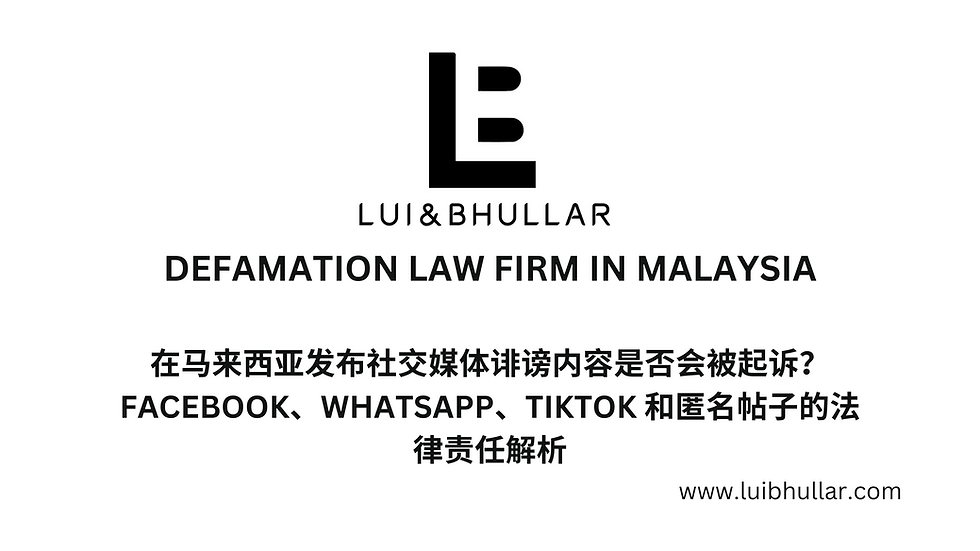How to Prove Defamation in Malaysia & Sue Anonymous Online Defamers: Legal Elements and Defences Explained
- Messrs Lui & Bhullar
- Jul 22, 2025
- 4 min read
Updated: Oct 15, 2025
BY MESSRS LUI BHULLAR

How to Prove Defamation in Malaysia & Sue Anonymous Online Defamers: Legal Elements and Defences Explained
If you're dealing with online defamation in Malaysia, particularly defamatory remarks posted on social media platforms like Facebook, WhatsApp, or Telegram, understanding the legal process is critical. Whether you're a victim of libel, slander, or social media defamation, this article outlines how to prove defamation, explains how to identify and sue anonymous online defamers, and discusses the main defences in Malaysian defamation law.
If you need tailored advice, consult a trusted defamation lawyer in Malaysia, especially one with experience in social media defamation and online defamation cases.
How to Prove Defamation in Malaysia: 3 Legal Elements You Must Establish
Under Malaysian defamation law, whether it involves libel (written) or slander (spoken), the plaintiff must prove three essential elements to succeed in court:
1. Defamatory Words
The statement must lower your reputation in the eyes of reasonable members of society. This includes accusations of criminal activity, corruption, dishonesty, or other attacks on personal or professional character.
Example: A Facebook post falsely claiming you are involved in fraud, or a viral WhatsApp message alleging you're running a Ponzi scheme.
Tip: Save screenshots and URLs. A defamation lawyer in KL can help assess if the language used is legally defamatory.
2. Reference to the Plaintiff
The defamatory content must clearly refer to you. This can be direct (naming you or your company) or indirect (using identifiers known to the community).
Example: A Telegram post saying “The director of XYZ Sdn Bhd has been cheating clients” when you’re the only director.
3. Publication to a Third Party
The statement must have been communicated to at least one other person besides the plaintiff. In the age of social media defamation, even one share or comment can satisfy this requirement.
Digital traces, timestamps, or forwarded messages can serve as critical evidence of publication.
How to Identify and Sue Anonymous Online Defamers
One of the biggest challenges in online defamation Malaysia is anonymity. Many defamers hide behind fake profiles or burner accounts, especially on platforms like Facebook or Telegram.
Here’s how you can proceed:
1. Preserve Evidence
Immediately take screenshots, save links, record metadata, and back up any defamatory content.
2. Seek a Court Order
Through your defamation lawyer, you can file an application for a Norwich Pharmacal Order or discovery request compelling platforms (e.g., Meta, Telegram) or ISPs to disclose the identity behind the account.
Malaysian courts have allowed such applications where defamatory content is serious and persistent.
3. File a Civil Lawsuit
Once the identity is known, you can initiate a defamation lawsuit seeking:
General damages for injury to reputation
Aggravated damages for malicious intent
Injunctions to remove the content or prevent further publication
If the anonymous defamer cannot be identified, you may still be able to seek an injunction against the platform or page administrator if there's sufficient control over the content.
What Are the Defences in Malaysian Defamation Law?
Once a defamation claim is filed, the defamer may raise defences to avoid liability. These include:
1. Justification (Truth)
If the defamatory statement is true, the defence of justification applies—even if the truth hurts the plaintiff's reputation. The burden is on the defendant to prove the truth with admissible evidence.
2. Fair Comment
This defence applies to opinions, not facts. The comment must be based on facts that are true, be made in the public interest, and not be malicious.
Example: A blog post criticising a public figure's policy decisions may be considered fair comment—unless it crosses into factual allegations of corruption.
3. Qualified Privilege
Applies in situations where the person making the statement has a legal, moral, or social duty to communicate it, and the recipient has a legitimate interest in receiving it. Examples include official reports, employee assessments, or police reports (with limits).
4. Absolute Privilege
Offers complete immunity from defamation lawsuits, even for false statements. Applies to:
Parliamentary proceedings
Judicial proceedings (court submissions, affidavits)
Certain executive functions
Your defamation lawyer in Malaysia will evaluate whether any of these defences apply or can be defeated in court.
Why You Should Engage a Defamation Lawyer in Malaysia
Whether you're facing libel, slander, social media defamation, or online defamation, an experienced defamation lawyer in KL is essential to:
Gather and preserve admissible evidence
Trace anonymous defamers
File urgent injunctions to remove content
Quantify damages
Navigate legal defences effectively
Final Thoughts
In a time when damaging statements can go viral within seconds, understanding how to prove defamation, trace anonymous online defamers, and counter possible legal defences is crucial. If your reputation or business is at risk due to social media defamation, don't wait. Consult a skilled defamation lawyer in Malaysia to protect your rights and restore your image. Need Legal Advice on Defamation?
If you're unsure how to sue for defamation in Malaysia or need to identify the person behind defamatory online content, consult our legal team today. At Messrs Lui & Bhullar, we combine strong legal strategy with digital expertise to hold online defamers accountable.
📧 Email: general@luibhullar.com
📞 WhatsApp: +60143000970




Comments